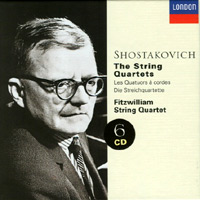 |
| September 15, 2004 The Unforgettable Fitzwilliam
Shostakovich began that cycle about ten years after he started writing symphonies, and he completed it three years after his last symphony, a year before his death. He composed the 15th work in each of those cycles knowing it would be the last. In his symphonies he became a chronicler of the life of his people, a life filled largely with suffering, oppression, and fear. The quartets are even more personal works: more intimate, as we might expect of chamber music, yet every bit as urgent and intense. Of course it is not necessary that we know anything about the "programmatic" or "autobiographical" aspects of the symphonies or the quartets: their communicative power is by no means so limited or particularized. Regardless of the imagery they may suggest to individual listeners, they are very much about making music, and about the joy and liberation of creating. But the personal markers are virtually inescapable in the quartets. Not only do we find the composer’s musical monogram -- the four-note motif D-S-C-B in some of the quartets*, but also citations of themes from his symphonies and other works. While, as already noted, we do not have to know what the composer was recalling or describing in this music, such gestures do tell us, in a more generalized sense, "I felt something deeply." Without looking for a definite image or event or any other specifics, this is something the listener can feel. Deep feeling need not always connote some tragedy or suffering. There is humor in several of the quartets, there are good tunes, and a warm heart, as well as helpings of sarcasm and bitterness and occasional defiance. This is not the place to enumerate and describe particular characteristics of each of the 15 quartets; anyone with working ears who hears one of them is certain to want to hear more of them, and will find his/her own favorites among them. Conveniently, there have been several recordings of the complete cycle, by such ensembles as the Borodin Quartet, the St Petersburg Quartet, the Emerson, the Brodsky, and the Manhattan Quartets. For me, there has been only one: the cycle recorded in first-rate stereophonic sound by the Fitzwilliam Quartet for Decca in the years 1975-77. This was the first recorded Shostakovich quartet cycle to comprise all 15 works. The LPs, of which there were seven, were issued one at a time. The first one was stunning, and each successive one not only maintained the standard thus set but seemed to reconfirm the unique authority of the four young Englishmen in this music. Christopher Rowland (violin I), Jonathan Sparey (violin II), Alan George (viola) and Ioan Davies (cello) made up the quartet; they were musicians in residence at York University in England, and after their Shostakovich began circulating they took up a similar position at Bucknell University in Lewisburg, Pennsylvania. Their collective insights were astonishing, though perhaps not entirely -- for they came to know Shostakovich in his last years and actually had the benefit of his coaching. He visited York when they introduced his Thirteenth Quartet there, and sent them the remaining two quartets when they were published; their scheduled later get-together in Moscow, however, was cut off by his death in 1975.
Curious, though, that in addition to the omission of the musicians’ names there is no mention of their direct and meaningful contact with Shostakovich. What gives this little tale its final poignancy is that the Fitzwilliam Quartet dissolved in 1986, not long after completing its remarkable Shostakovich cycle and a few other LPs for Decca: Borodin, Delius, Franck, the Shostakovich Piano Quintet with Vladimir Ashkenazy. Perhaps because of the unexpectedness, it was as if, with the completion of the Shostakovich cycle, the foursome had achieved its foreordained mission and simply had no compelling need to continue. Ten or 12 years later, though, the Fitzwilliam Quartet was reorganized, with Jonathan Sparey and Alan George in their original positions but new colleagues as leader and cellist, and now with a greater emphasis on earlier music. Now the foursome has even re-established its residency at Bucknell, and begun one at Fitzwilliam College, the school whose name was taken because two of the original members had been graduates of that institution. The repertory emphasis is different now: it is largely on 18th-century material, and the Fitzwilliam tours with two sets of instruments in order to play that material on "original instruments." Meanwhile, the original Fitzwilliam Shostakovich remains a great deal more than a mere souvenir of the group’s earlier activity: it is for many of us the definitive realization of these 15 works, and as such it is simply indispensable. ...Richard Freed *Our B-natural being known as H in German usage, the four notes thus a German transliteration of the two Cyrillic letters that are the initials of Dmitri Shostakovich.
Ultra Audio is part of the SoundStage! Network. |
 Dmitri Shostakovich composed 15 string
quartets, the same number as his symphonies. We don’t hear the quartets nearly as
much as we hear the symphonies, but they constitute a remarkable cycle; there is really
not a dull or weak piece among them.
Dmitri Shostakovich composed 15 string
quartets, the same number as his symphonies. We don’t hear the quartets nearly as
much as we hear the symphonies, but they constitute a remarkable cycle; there is really
not a dull or weak piece among them. In 1997 Decca (still London Records
in the USA at that time) brought out the whole cycle in an economical set of six CDs (455
776-2), which was also taken up by the mail-order Musical Heritage Society. The Decca
folks didn’t bother to list the names of the quartet’s four members anywhere in
the documentation. Only Alan George’s name appears, but he is not even identified as
a member of the quartet: he provided the superb annotation for the original LP releases,
and apparently Decca had him revise and condense that material in a way suitable to a
presentation of the complete cycle.
In 1997 Decca (still London Records
in the USA at that time) brought out the whole cycle in an economical set of six CDs (455
776-2), which was also taken up by the mail-order Musical Heritage Society. The Decca
folks didn’t bother to list the names of the quartet’s four members anywhere in
the documentation. Only Alan George’s name appears, but he is not even identified as
a member of the quartet: he provided the superb annotation for the original LP releases,
and apparently Decca had him revise and condense that material in a way suitable to a
presentation of the complete cycle.